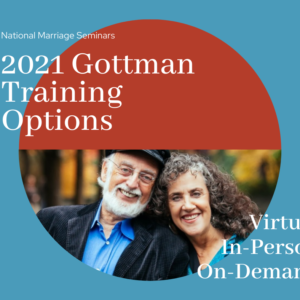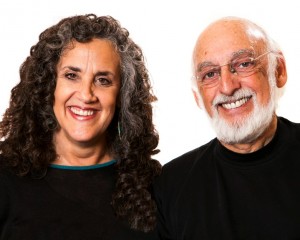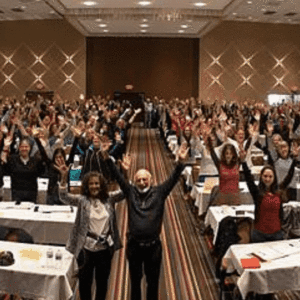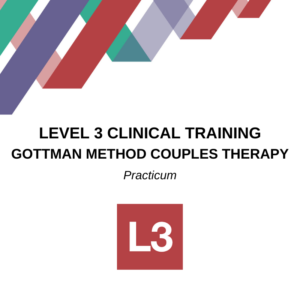Practicum
- Please contact lori@nationalmarriageseminars.com regarding our payment plan option.
Through videotaped cases of real couples, hands-on role plays, demonstrations of assessments and interventions, and nuanced discussion of technique, the Level 3 Practicum significantly expands your understanding of when and how to use Gottman Method approaches.
Via Zoom with individual group rooms, you will have the opportunity to practice and refine your use of Gottman Method therapy and receive personalized guidance in developing a roadmap for clinical decisions.
Level 3 Practicum content represents the true resistances and co-morbidities we face as therapists and how we can transform them into effective healing methods for the couple.
The workshop is structured to help create a safe and secure environment so participants can learn and practice while feeling free of criticism and negative judgment.
Program Objectives:
At the completion of this training you will be able to:
- Choose an intervention that is appropriate for the clients at the moment.
- Recognize the Four Horseman when one member of a couple exhibits that behavior.
- Stop the couple’s dyadic interaction when one member exhibits one of the four horseman. Describe the Four Horseman to the couple.
- Explain the antidote to the relevant horseman clearly and accurately.
- Coach the person with an alternative way to express him- or herself using an appropriate antidote.
- Re-direct the couple to resume communication in a dyadic way. Continue to monitor for the four horsemen and intervene if they reemerge.
- Identify when one or both partners are physiologically flooded (and not just upset) and stop the interaction between the couple.
- Provide a brief explanation of flooding in clear, sensitive language.
- Intervene by guiding one or both partners through a relaxation technique before continuing.
- Explain the Dreams Within Conflict process and goals clearly.
- Instruct couple on the Dreams Within Conflict intervention.
- Assist one partner to ask the other partner questions about the dream or deeper meaning imbedded in their specific gridlocked issue.
- Provide The Dream Catcher Questions handout and coach one partner to ask the other questions from the handout to increase understanding of their partner’s underlying dreams or deeper meaning embedded in the specific gridlocked issue; help the couple hold to the questions to go deeper vs. getting into their own point of view.
- Introduce the concept of softened start-ups and explain why it helps (i.e., it is easier for their partner to hear and understand their point).
- Explain research showing that the first three minutes of a discussion predicts whether that discussion will go well and whether their overall relationship will go well.
- Explain importance of expressing needs in positive terms and instruct the partner to restate their point without criticism and then direct them to resume dyadic interaction.
- Stop couple’s interaction when one or both partners are not accepting influence.
- Explain the need for accepting influence (which may include reference to research). This includes finding a way to understand and honor some aspect of their partner’s position, with a focus on yielding and accepting influence rather than on persuading.
- Stop couple and instruct in the concept of offering and accepting repairs and why it is useful.
- Provide the Repair Checklist and explains it use.
- Ask appropriate Gottman Oral History questions and stay on track with sensitivity to couple’s issues and building rapport.
- Conduct Oral History interview with appropriate timing.
- Conduct Oral History interview with sensitivity to issues of co-morbidity.
What is included in the price?
*Cost includes: 3-day or 4-day Virtual Training, 200-page PDF Clinical Manual, Access to Live Therapy Sessions ($75 value), Certificate of Completion of Level 3 Training, 19 CE hours available for purchase ($39.99), Ability to be listed on the Gottman Referral Network, Qualified to continue on the Gottman Certification Track
Who is this training for?
This training is for psychologists, social workers, Marriage and Family Therapists (MFTs), professional counselors, addiction counselors, and other mental health professionals. Completion of Level 1 Training live or on-demand and Level 2 Training live or on-demand is required, as well as a master’s degree, doctoral degree, or current enrollment in a graduate program within a mental health-related field is required. Therapy experience is highly recommended, but not required.
Becoming a Certified Gottman Therapist is the final step in your journey toward becoming a career couples therapist. You will master how to help couples create greater meaning and connection in their relationships, and you will expand and reinforce your understanding of Gottman Method Couples Therapy, building off of everything you’ve learned through your training and clinical work to date. Learn more about the Certification Track.
Video Participation: Case Discussion in Certification Practicum
Participants are asked to upload a short (ten minute or so) video segment of difficult and challenging couples to the Level 3 workshop. The therapist’s work with the couple will not be critiqued; in fact, the video does not even need to show the therapist; just seeing the couple is all that is needed. The purpose will be to use these couples to illustrate how the Gottman Method can be applied to these tough cases. The Gottman Trainer will describe how they would treat these couples and then participants from the audience will volunteer to role-play these couples with the trainer demonstrating a variety of interventions. Participants will then have the opportunity to practice using these interventions in a supportive small group setting with other participants’ role-playing the couples from the videos.
Bringing a videotape isn’t required, but it will help make the training more meaningful for everyone. If you cannot bring a taped segment, it would help to bring a brief written description of a challenging couple for the same purpose. This is for Case Discussion within the context of Certification Practicum ONLY and is not related to the videotaped interventions submitted for the final Certification Review.
Select an Upcoming Training Session
-
Gottman Level 3 Bundle
$1,095.00 -
GOTTMAN LEVELS 1-3 BUNDLE
$1,899.00 -
CERTIFIED GOTTMAN THERAPIST BUNDLE
$2,200.00





